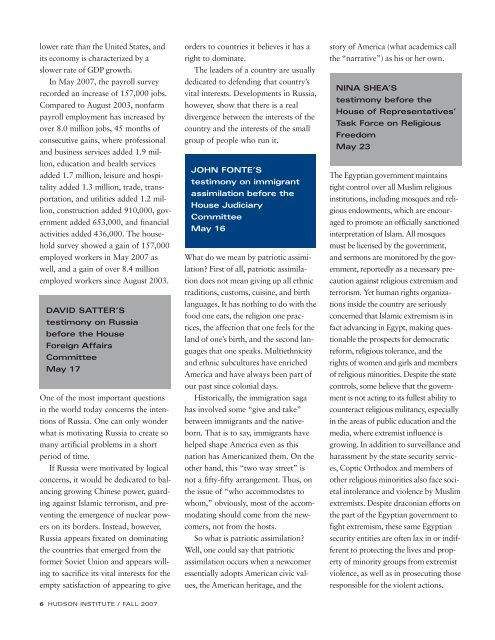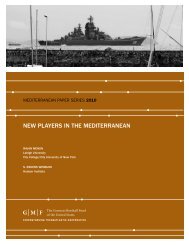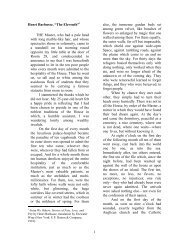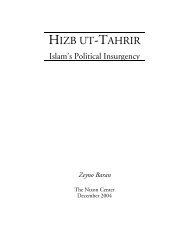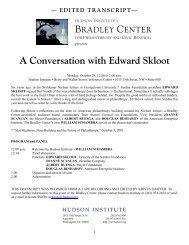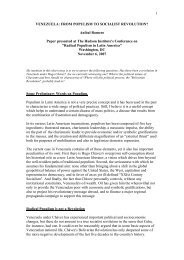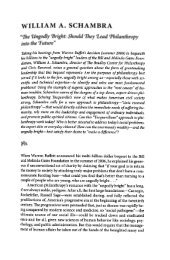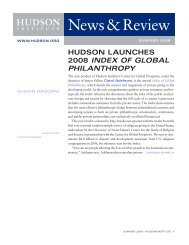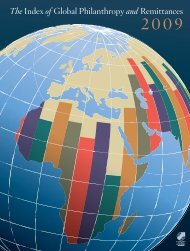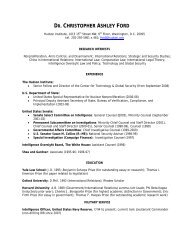You also want an ePaper? Increase the reach of your titles
YUMPU automatically turns print PDFs into web optimized ePapers that Google loves.
lower rate than the United States, and<br />
its economy is characterized by a<br />
slower rate of GDP growth.<br />
In May 2007, the payroll survey<br />
recorded an increase of 157,000 jobs.<br />
Compared to August 2003, nonfarm<br />
payroll employment has increased by<br />
over 8.0 million jobs, 45 months of<br />
consecutive gains, where professional<br />
and business services added 1.9 million,<br />
education and health services<br />
added 1.7 million, leisure and hospitality<br />
added 1.3 million, trade, transportation,<br />
and utilities added 1.2 million,<br />
construction added 910,000, government<br />
added 653,000, and financial<br />
activities added 436,000. The household<br />
survey showed a gain of 157,000<br />
employed workers in May 2007 as<br />
well, and a gain of over 8.4 million<br />
employed workers since August 2003.<br />
DAVID SATTER’S<br />
testimony on Russia<br />
before the House<br />
Foreign Affairs<br />
Committee<br />
May 17<br />
One of the most important questions<br />
in the world today concerns the intentions<br />
of Russia. One can only wonder<br />
what is motivating Russia to create so<br />
many artificial problems in a short<br />
period of time.<br />
If Russia were motivated by logical<br />
concerns, it would be dedicated to balancing<br />
growing Chinese power, guarding<br />
against Islamic terrorism, and preventing<br />
the emergence of nuclear powers<br />
on its borders. Instead, however,<br />
Russia appears fixated on dominating<br />
the countries that emerged from the<br />
former Soviet Union and appears willing<br />
to sacrifice its vital interests for the<br />
empty satisfaction of appearing to give<br />
orders to countries it believes it has a<br />
right to dominate.<br />
The leaders of a country are usually<br />
dedicated to defending that country’s<br />
vital interests. Developments in Russia,<br />
however, show that there is a real<br />
divergence between the interests of the<br />
country and the interests of the small<br />
group of people who run it.<br />
JOHN FONTE’S<br />
testimony on immigrant<br />
assimilation before the<br />
House Judiciary<br />
Committee<br />
May 16<br />
What do we mean by patriotic assimilation?<br />
First of all, patriotic assimilation<br />
does not mean giving up all ethnic<br />
traditions, customs, cuisine, and birth<br />
languages. It has nothing to do with the<br />
food one eats, the religion one practices,<br />
the affection that one feels for the<br />
land of one’s birth, and the second languages<br />
that one speaks. Multiethnicity<br />
and ethnic subcultures have enriched<br />
America and have always been part of<br />
our past since colonial days.<br />
Historically, the immigration saga<br />
has involved some “give and take”<br />
between immigrants and the nativeborn.<br />
That is to say, immigrants have<br />
helped shape America even as this<br />
nation has Americanized them. On the<br />
other hand, this “two way street” is<br />
not a fifty-fifty arrangement. Thus, on<br />
the issue of “who accommodates to<br />
whom,” obviously, most of the accommodating<br />
should come from the newcomers,<br />
not from the hosts.<br />
So what is patriotic assimilation?<br />
Well, one could say that patriotic<br />
assimilation occurs when a newcomer<br />
essentially adopts American civic values,<br />
the American heritage, and the<br />
story of America (what academics call<br />
the “narrative”) as his or her own.<br />
NINA SHEA’S<br />
testimony before the<br />
House of Represent a tives’<br />
Task Force on Religious<br />
Freedom<br />
May 23<br />
The Egyptian government maintains<br />
tight control over all Muslim religious<br />
ins titutions, including mosques and religious<br />
endowments, which are encouraged<br />
to promote an officially sanctioned<br />
interpretation of Islam. All mosques<br />
must be licensed by the government,<br />
and sermons are monitored by the government,<br />
reportedly as a necessary precaution<br />
against religious extremism and<br />
terrorism. Yet human rights organizations<br />
inside the country are seriously<br />
con cerned that Islamic extremism is in<br />
fact advancing in Egypt, making questionable<br />
the prospects for democratic<br />
reform, religious tolerance, and the<br />
rights of women and girls and members<br />
of religious minorities. Despite the state<br />
controls, some believe that the government<br />
is not acting to its fullest ability to<br />
counteract religious militancy, especially<br />
in the areas of public education and the<br />
media, where extremist influence is<br />
grow ing. In addition to surveillance and<br />
harassment by the state security services,<br />
Coptic Orthodox and members of<br />
other religious minorities also face societal<br />
in tolerance and violence by Muslim<br />
ex tremists. Despite draconian efforts on<br />
the part of the Egyptian government to<br />
fight extremism, these same Egyptian<br />
security entities are often lax in or indifferent<br />
to protecting the lives and property<br />
of minority groups from extremist<br />
violence, as well as in prosecuting those<br />
responsible for the violent actions.<br />
6 HUDSON INSTITUTE / FALL 2007


